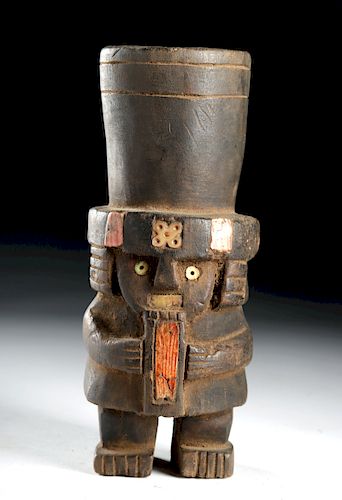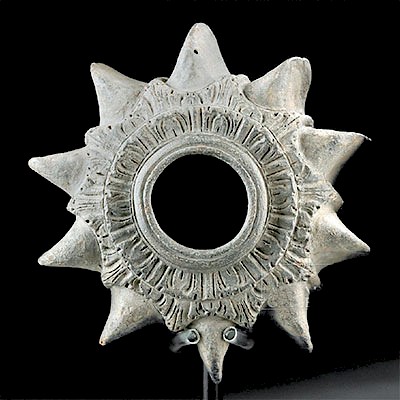Huari Wood, Shell & Nacre Figural Kero - Pan Flutist
Lot 29e
About Seller
Artemis Fine Arts
686 S Taylor Ave, Ste 106
Louisville, CO 80027
United States
Selling antiquities, ancient and ethnographic art online since 1993, Artemis Gallery specializes in Classical Antiquities (Egyptian, Greek, Roman, Near Eastern), Asian, Pre-Columbian, African / Tribal / Oceanographic art. Our extensive inventory includes pottery, stone, metal, wood, glass and textil...Read more
Estimate:
$2,800 - $4,200
Absentee vs Live bid
Two ways to bid:
- Leave a max absentee bid and the platform will bid on your behalf up to your maximum bid during the live auction.
- Bid live during the auction and your bids will be submitted real-time to the auctioneer.
Bid Increments
| Price | Bid Increment |
|---|---|
| $0 | $25 |
| $300 | $50 |
| $1,000 | $100 |
| $2,000 | $250 |
| $5,000 | $500 |
| $10,000 | $1,000 |
| $20,000 | $2,500 |
| $50,000 | $5,000 |
| $100,000 | $10,000 |
| $200,000 | $20,000 |
About Auction
By Artemis Fine Arts
Jul 25, 2019
Set Reminder
2019-07-25 10:00:00
2019-07-25 10:00:00
America/New_York
Bidsquare
Bidsquare : Pre-Columbian | Tribal | Ethnographic
https://www.bidsquare.com/auctions/artemis-gallery/pre-columbian-tribal-ethnographic-4291
Featuring ancient and ethnographic art from around the world, including Pre-Columbian, Native American, African / Tribal, Ethnographic, Spanish Colonial, Fossils, Fine Art, much more. Many Oceanic pieces from an important Tucson, Arizona collection, first time at auction!! Artemis Fine Arts info@artemisfinearts.com
Featuring ancient and ethnographic art from around the world, including Pre-Columbian, Native American, African / Tribal, Ethnographic, Spanish Colonial, Fossils, Fine Art, much more. Many Oceanic pieces from an important Tucson, Arizona collection, first time at auction!! Artemis Fine Arts info@artemisfinearts.com
- Lot Description
Pre-Columbian, South Coast Peru, Huari (Wari), ca. 700 to 1000 CE. An interesting example of a hand-carved wooden kero (drinking cup) with a wide base, a bulbous body, and a thick shoulder surmounted by a small cylindrical vessel. The lower body of the composition depicts a stylized musician standing on delineated legs, with bent arms holding a vertical set of pan flutes, and wearing lengthy robes and a thick headdress with short, striated ear flaps. The eyes, mouth, and clover-form headdress ornament are composed of inlaid mother-of-pearl (also known as nacre), and light-orange pieces of spondylus shell accentuate additional headdress panels as well as the body of the pan flute. An intriguing and elegantly-decorated example from ancient Peru! Size: 3.125" W x 7.75" H (7.9 cm x 19.7 cm).
The Huari/Wari culture began to develop during the late Moche era. This culture, centered on a capital to the south of Moche territory in the central highlands of Peru, rose as the Moche culture fell apart and before the Chimu asserted themselves on the north coast. They had extensive contact with other regions in the Andes, most notably the Tiahuanaco in present-day Bolivia, and the Nazca and the Pachacamac on the south and central coast of Peru. Hence there is no homogenous Huari style. Instead we see a wide range of visual expressions in their wood carvings and ceramics.
Provenance: private New York, New York, USA collection
All items legal to buy/sell under U.S. Statute covering cultural patrimony Code 2600, CHAPTER 14, and are guaranteed to be as described or your money back.
A Certificate of Authenticity will accompany all winning bids.
We ship worldwide and handle all shipping in-house for your convenience.
#146494Minor abrasions and nicks to legs, body, head, vessel, and inlays, with light encrustations within some recessed areas, and light softening to some finer details, otherwise intact and excellent. Light earthen deposits and great dark patina throughout.Condition
- Shipping Info
-
All shipping is handled in-house for your convenience. Your invoice from Artemis Gallery will include shipping calculation instructions. If in doubt, please inquire BEFORE bidding for estimated shipping costs for individual items.
-
- Buyer's Premium



 EUR
EUR CAD
CAD AUD
AUD GBP
GBP MXN
MXN HKD
HKD CNY
CNY MYR
MYR SEK
SEK SGD
SGD CHF
CHF THB
THB
















